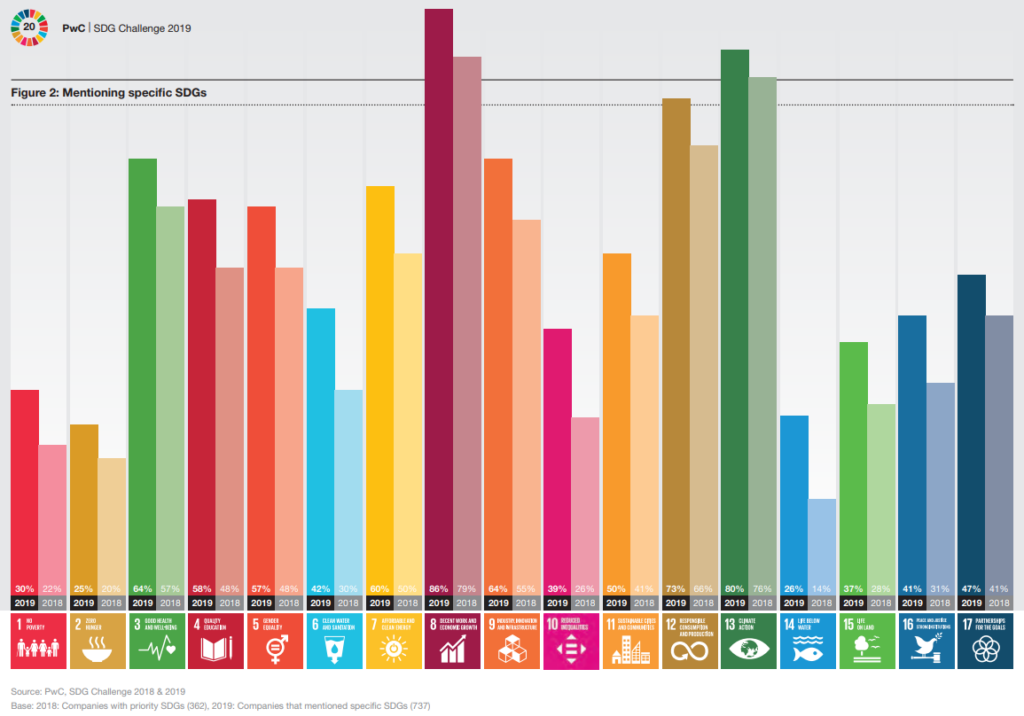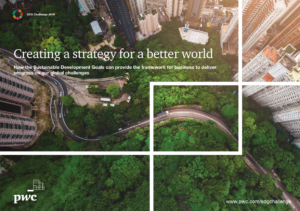While there is a general acknowledgement of the importance of the United Nations’ Sustainable Development Goals (SDGs) among organizations, there is room for more concrete action to take place in support of the SDGs if these are to be achieved by 2030, says a recent study by UK-based PwC. In general, ‘climate action’ was high on the agenda for most companies, but ‘life below water’ was identified as less important.
In its largest analysis of published reporting on the UN Sustainable Development Goals (SDGs) to date, PwC explored over 1,000 company reports to find out how businesses are engaging with the SDGs.
Key figures
- 72% of companies mentioned the SDGs in their reporting
- 25% of companies included the SDGs in their published business strategy
- 21% of CEO or Chair statements include reference to the SDGs
- 14% of companies mentioned specific SDG targets.
Nearly two thirds (65%) of the companies analysed referred to specific SDGs – suggesting that, at least on some level, they have attempted to identify the goals most relevant to their business and societal value.
The top three SDGs mentioned in the companies under review were:
- Decent Work and Economic Growth (SDG8),
- Climate Action (SDG13) and
- Responsible Consumption and Production (SDG12).
This mirrors the 2018 report where we considered which goals, if any, companies were making a priority.
Languishing at the bottom of companies’ attention are:
- Zero Hunger (SDG2),
- Life Below Water (SDG14),
- No Poverty (SDG1) and
- Life on Land (SDG15).
This somewhat mirrors the country findings report produced by SDSN12, which notes that on average countries obtain their worst scores for Life Below Water (SDG14) and Life on Land (SDG15).
It is encouraging that Climate Action (SDG13), appears in the top 3 goals for business in all but one country. Less encouraging is the fact that Life Below Water (SDG14) doesn’t appear in the business top 3 of any of the countries in our sample.
The selection of individual SDGs becomes more informative when seen from an industry sector perspective.
Each sector appears to have selected the goals that have the most direct impact on their operations.

So many companies are now taking some form of action, so many investors are demanding greater accountability and so many consumers are demanding better options, that embracing sustainable business is becoming a must to remain competitive.
Research reveals that individual corporate initiatives are likely not enough; rather, companies will almost certainly have to work from a common roadmap to transform entire industry sectors in order to make progress towards fixing the systems our world depends on – whether they be food, transport, energy or finance.
The framework for that common roadmap already exists in the form of the UN SDGs. Now is the time to do that by using the targets associated with the individual goals to shape the overall strategy of the business. And that strategy, which encompasses SDG ambitions, has to be operationalised throughout the organisation, its success measured and progress reported on. By making the SDGs central to business strategy, and by doing it at scale throughout companies and across industry sectors, we can still affect the system transformations that will be central to all our futures.
Explore more herebelow:































































